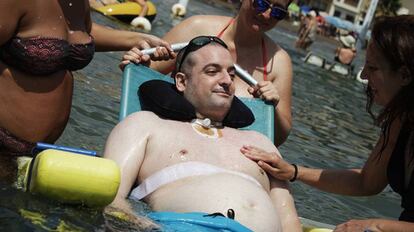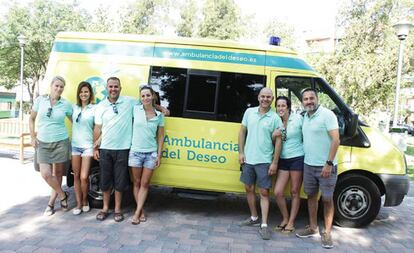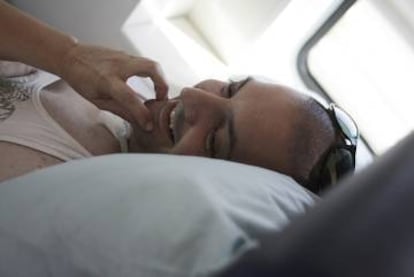The Spanish health workers who make wishes come true
A group of volunteers in Murcia is using an ambulance to take terminally ill patients and people with reduced mobility to places that would otherwise be impossible for them to reach


Paca, 82, was able to see her home town in Cáceres, in Spain’s western Extremadura region, for one last time before dying. The parents of Hugo, an 11-month-old baby with chronic illness, were granted their wish for him to see the sea. Fabri, a terminally sick boy who wanted to return to his home country of Ecuador and die surrounded by his family, was able to overcome the logistical challenges involved with being transferred while hooked up to machines and medication.
I am very happy, very. If I drown in the water, I wouldn’t mind
Sergio Romero, who suffers from degenerative polyneuropathy
All this was made possible thanks to Ambulancia del Deseo (or Ambulance of Wishes), an initiative organized by a group of health workers from Murcia, in southeastern Spain, aimed at fulfilling the dreams of mobility-impaired and dying patients. The project was inspired by Kees Veldboer, a Dutch ambulance driver who in 2007 agreed to take retired seaman Mario Stefanutto to Rotterdam harbor. After making a few calls and borrowing an ambulance, Veldboer was able to make Stefanutto happy for a few hours and fulfill his dying wish to say goodbye to the port. Two months later, Veldboer created the Stichting Ambulance Wens foundation. The Murcia health workers brought the founder to a conference in 2018. “We liked his initiative so much we decided to do the same thing here,” they explain.
The Ambulance of Wishes has now been operating for a little more than a year. “The wishes are a way of giving back, and people are very keen to take part,” explained Laura Juguera and Carolina Cánovas, founders of the project, as they helped make another wish come true at the end of August. The volunteers were helping Sergio Romero, a 36-year-old man with degenerative polyneuropathy who wanted to bathe in the sea at Mazarrón Bay. “I am whiter than Snow White,” he joked, as he was brought into the water.

The last time that Romero had set foot on the coast was five years ago, when his daughter was born and before falling ill. He had already lost his hearing when he was seven years old, and 25 years later he was diagnosed with a rare degenerative disease that has affected his vision, his ability to speak (he had a tracheotomy to make it easier to breathe), and left him paralyzed from the arms down. “It is a degenerative disease and he got a full-blown version,” says his wife, Lourdes Garcia.
The Ambulance of Wishes team picked up Romero from his house, and after an hour’s drive they arrived at the seaside promenade of Mazarrón Bay, where his family were waiting for him on the beach with food and drinks. Everyone wanted the day to be special, one they would remember with a smile. Romero may have difficulty talking, hearing and seeing, but his family can communicate by making signs and talking close to his face.
“It smells of the sea,” said Romero, with his sunglasses on and covered in sunscreen, as soon as he was taken out of the ambulance. “I am very happy, very. If I drown in the water, I wouldn’t mind,” he joked. Romero is an optimistic and decisive person. He loves soccer and watching TV shows such as Breaking Bad, The Wire and Game of Thrones. He is also completing a dual degree in documentation science and journalism.

“I was very excited when I went into the water and cried like a little boy,” said Romero with the help of his interpreter, José Manuel. “I can’t walk, but if I could I would go somewhere I’ve never been.” According to Romero, he can “see” better since his illness stripped him of his sight. “I have more courage now than before, and I feel liberated,” he said, encouraging other sick people not to give up.
The Ambulance of Wishes has very few conditions when it comes to granting wishes. Anyone can ask for a wish via their website, as long as it is for emotional reasons, and the person in question cannot move on their own and needs an ambulance. José Manuel Salas, an emergency room doctor and another of the organization’s founders, says that granting wishes creates very special and emotional moments. “You have to accompany them and know how to listen, not just be standing there,” he explains.
English version by Melissa Kitson.
Tu suscripción se está usando en otro dispositivo
¿Quieres añadir otro usuario a tu suscripción?
Si continúas leyendo en este dispositivo, no se podrá leer en el otro.
FlechaTu suscripción se está usando en otro dispositivo y solo puedes acceder a EL PAÍS desde un dispositivo a la vez.
Si quieres compartir tu cuenta, cambia tu suscripción a la modalidad Premium, así podrás añadir otro usuario. Cada uno accederá con su propia cuenta de email, lo que os permitirá personalizar vuestra experiencia en EL PAÍS.
¿Tienes una suscripción de empresa? Accede aquí para contratar más cuentas.
En el caso de no saber quién está usando tu cuenta, te recomendamos cambiar tu contraseña aquí.
Si decides continuar compartiendo tu cuenta, este mensaje se mostrará en tu dispositivo y en el de la otra persona que está usando tu cuenta de forma indefinida, afectando a tu experiencia de lectura. Puedes consultar aquí los términos y condiciones de la suscripción digital.








































